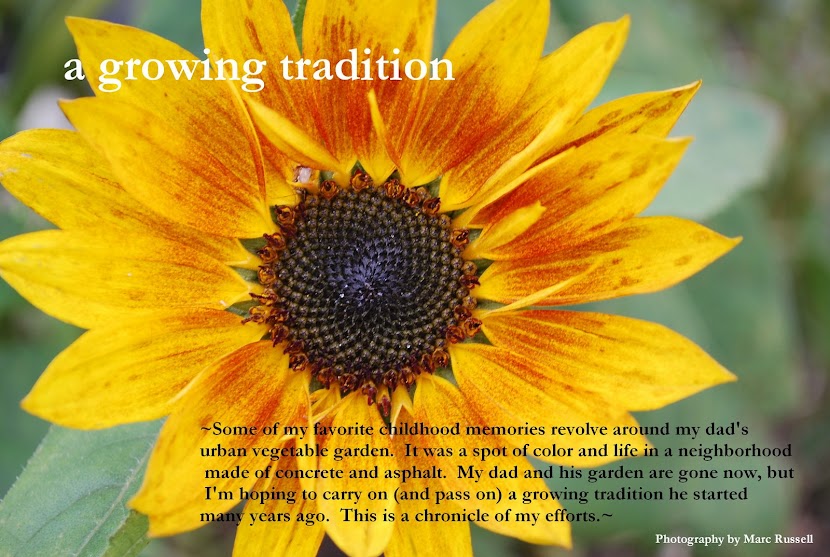When constructing my raised beds and garden gate, I was faced with the dilemma of whether or not to use pressure treated wood. Like with many other modern-day inventions, it seems as though we're forced to weigh the benefits of convenience (or in this case, durability) against the potential safety and health risks involved. While I was aware that Arsenic was no longer being used in the process of treating the wood, I wasn't able to find any real consensus on whether or not the new preservatives, which might end up in our soil, were "safe". The best I could find was this post by Penn State Master Gardeners. And unless the rules have changed, it seems that the USDA still does not allow certified organic farmers to use pressure treated wood in their production beds.
I guess I wanted to get a sense of what other gardeners knew or felt about this particular subject. Do you use pressure treated wood in your vegetable garden?
Subscribe to:
Post Comments (Atom)

No way. I figure even if the government labeled it "safe" I wouldn't believe them. I stick to cedar and pine, but I know there are plenty of people out there using treated wood. Some just line the bed with plastic.
ReplyDeleteI have no problem with treated wood, and use it in 2/3 of my raised beds. That is really all I should say on the subject, as I can easily become argumentive about it.
ReplyDeleteHaha...good enough. Thanks for you answer EG!
ReplyDeleteNo pressure treated wood anywhere on my property. This is going to cause some headaches when I go to do my deck (because the code calls for pressure treated lumber for the base, so I will have to use the Trex for the entire structure which is a bit pricey, but worth not leaching toxins into my small property).
ReplyDeleteThe government over the years has labeled many things safe only to turn around and "discover" they are no longer safe for us, I for one won't be their guinea pig. I prefer brick for my raised beds.
We work with wood a lot because much of our business involves building planters and decks, and based on what our carpenters say about the toxicity of the dust, I would not use it.
ReplyDeleteI know you're thinking leaching, not dust, but we just don't know enough about how much leaches into the soil and how fast.
I was lucky enough to have a lot of redwood boards saved from a deck we removed from our house, but if I do have to replace any of them, I will probably get pressure treated lumber. But I'm the type that puts Equal sweetener in my morning coffee. Talk about getting into heated arguments about things, pressure treated lumber and artificial sweeteners are on about the same level!
ReplyDeleteKelly and THM - It's a fair argument to say that the government does not have a good track record of determining what is "safe."
ReplyDeleteMarie - good point about the dust. I noticed that home depot still advices you to use gloves, glasses and breath masks when working with treated wood. Though I guess one could argue that you should be wearing these things whenever you're working with any sort of building materials.
Granny - you are too funny. I will admit that I've probably drank enough crystal light in my life time to equal many decks of pressure treated wood.
With pressure treated wood, your wood will last longer and not decay. The chemicals used are suspect. Nice boards, but the gardener's got a lousy immune system. Seems to be a no-brainer.
ReplyDeleteI've gardened organically for 23 years and would not ever consider chemically treated wood. There are alternatives for raised beds: field rocks or even cut pine or cedars. I have worked with each of those perfectly fine. Beds don't need to be 'contained' to be raised and wood doesn't need to be milled boards.
Hi Lynn, I appreciate the advice from a seasoned pro! I ended up using untreated pine for my main beds and recycled pine logs for my side beds. I'm happy with the results!
ReplyDeleteI used untreated this year, but they're already looking pretty ragged after just a few months. I was thinking of getting treated wood and then wrapping it with plastic (the kind you get to seal off your windows in the wintertime). Hopefully that will be the best of both worlds.
ReplyDeleteHi Thomas. I wouldn't want to have pressure treated lumber anywhere near my garden (especially if like you i was raising food to feed a toddler). I'm not even sure that the plastic alternatives like Trex are chemically stable. My own garden bed has gotten raised by itself over the years of adding organic materials to it, but it doesn't have the nice crisp edges that your edged beds have. If i used anything at all, i'd use untreated lumber scraps and know that every few years i'd have to toss them in the compost heap or put fresh boards outside them once they began to decompose too much (which i would actually take as a good sign...).
ReplyDelete